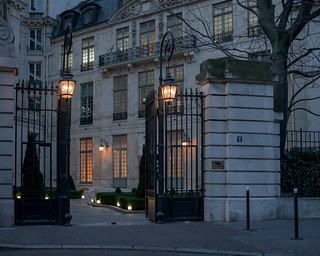
PREV ARTICLE
NEXT ARTICLE
FULL ISSUE
PREV FULL ISSUE
THE RISE AND FALL OF ARISTOPHILJohn Sallay forwarded this New York Times article from February 21, 2020 about the rise and fall of Aristophil, a French firm which bought and sold shares in rare books, autographs and manuscripts. -Editor
"Adjugé!" said a gray-haired auctioneer, over and over, as he gaveled away nearly every one of the 200 lots for sale at Drouot, an auction house, in Paris in mid-November. The sale generated $4.2 million, which might sound like a triumph. Actually, the sale was a fiasco, or, more precisely, one part of an ongoing fiasco. All of the items came from a now-defunct company, Aristophil, which starting in 2002 built one of the largest collections of rare books, autographs and manuscripts in history — some 136,000 pieces in all. The buying spree turned the company's founder and president, a stout 71-year-old named Gérard Lhéritier, into a celebrity. He opened the stately Museum of Letters and Manuscripts in a pricey neighborhood in Paris, and surrounded himself with French luminaries. They included former presidents, authors and journalists, who crowned him the "king of manuscripts." Today he's widely known by a less flattering name, "the Bernie Madoff of France." Six years ago, the French authorities shut down Aristophil and arrested Mr. Lhéritier, charging him with fraud and accusing him of orchestrating what amounts to a highbrow Ponzi scheme. As he bought all those rare manuscripts and letters, he had them appraised, divided their putative value into shares and sold them as if they were stock in a corporation. Those shares were bought by 18,000 people, many of them elderly and of modest means, who collectively invested about $1 billion. The authorities seized the entire collection and hired a company to catalog and auction off all 136,000 pieces, a process that will take years and hundreds of sales, just like the one in November. The hope is to return as much money as possible to investors, which, based on the more than two dozen auctions already held, will amount to perhaps 10 cents on the dollar. The problem has nothing to do with quality. Everything in the collection is authentic, and a large part of it is highly coveted. But the authorities say that with the help of pliant experts, Mr. Lhéritier grossly inflated the value of pieces before he sold shares in them. A set of Einstein documents he bought from Christie's in 2002 for $560,000, for instance, was divided into hundreds of shares and sold at a valuation of $13 million. Seventeen years ago, Mr. Lhéritier crashed through the doors of the genteel market for manuscripts with all the subtlety of a famished wild boar. That Einstein collection was the first he divvied into virtual shares. Soon, representatives of Aristophil were rampaging through auctions around Europe and the United States, outbidding everyone for anything of quality. By one estimate, Aristophil wound up with 5 percent of the global market for rare books and manuscripts. The largess helped spread word of the extraordinary sums Aristophil was paying for rare books. And that caused Europeans to rummage through their libraries and sell off their treasures. Typically, rare manuscripts trickle into the market as they are inherited or discovered. Now, there was a flood. One expert estimates that a century's worth of items were coaxed out of private hands in 15 years. Mr. Lhéritier benefited from a cycle: The publicity pried loose more documents, and the documents brought in more investors, which generated more publicity, which brought in more documents, and so on. John adds: I assume there are numismatic investment vehicles, which I also assume are legal and being run with fair intent, but the parallels between the antiquarian book market and the numismatic market – not to mention the numismatic book market – might provide some sort of cautionary tale. Buyer beware. A number of numismatic investment funds have come and gone over the years. Many were quite honestly run, yet failed to deliver the gains investors hoped for. I hadn't heard of Aristophil, but I'm not into the autograph and manuscript world. Such a large player does create market distortions. Independent sellers who took the cash were winners in the game. No one who provided inflated fake estimates should get off scot free, but that can be hard to prove. -Editor To read the complete article, see:
Wayne Homren, Editor The Numismatic Bibliomania Society is a non-profit organization promoting numismatic literature. See our web site at coinbooks.org. To submit items for publication in The E-Sylum, write to the Editor at this address: whomren@gmail.com To subscribe go to: https://my.binhost.com/lists/listinfo/esylum All Rights Reserved. NBS Home Page Contact the NBS webmaster 
|
